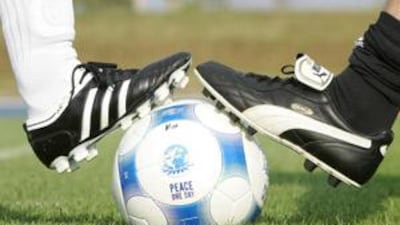Loyalty to a sports team can often be the cause of deep seated rivalries, but a football match between Puma and Adidas hoped to do just the opposite. Organised by the Peace One Day non-profit organisation, the game intended to ease tensions between the companies that go back over 60 years when a feud in the Dassler family split not only it, but also the Bavarian town of Herzogenaurach, where the family and two sportswear manufacturers originate.
The sons of a shoemaker, Adolf (Adi) and Rudolf (Rudi) Dassler practised the trade together, making sports shoes in their family home in the 1920s. Together they formed the Dassler Brothers Shoe Factory, a successful company until the relationship between the brothers disintegrated. Different stories have attempted to explain the rift. According to one version, during an air raid Rudi yelled that the pigs were coming, ostensibly referring to attackers, but because Adi and his family were entering the shelter as the words were uttered, this insult was interpreted as personal and was never forgiven.
Another story recounts that while both brothers served in the German army during the Second World War, Rudi's stronger connection with the Nazis was what tore the brothers apart. Whatever it was, the acrimony between them would remain unresolved even at the time of Rudi's death in 1974 (Adi died four years later). During the war, Rudi was captured by US forces, accused of working for the SS, and held as a prisoner of war until 1948. Upon returning to Herzogenaurach, Rudi had been shut out of the Adidas company his brother had launched in his absence. His response was to start his own firm, initially calling it Ruda (the first two letters of his first and last names), later changing it to Puma. Since then the two companies have fought bitterly to out-compete each other for the international sportswear market.
The Brazilian football star Pele was paid $120,000 (Dh44,000) to wear Puma shoes during the 1970 World Cup Finals, which his team subsequently won. The deal with Puma involved him bending down to tie the laces just before a free kick, just so the camera could go close up on the Puma logo. Adi, at one point, hired a local fishmonger who was also an Adidas fan, to paint the company's logo on his stand, which happened to sit right outside Rudi's office window. Adi also claimed the title "best sports shoe manufacturer in the world", which was challenged and ultimately beaten by Rudi in court.
In addition to fracturing the Dassler family, the internecine rivalry spilt out into the rest of the town, which is coincidentally divided in two by the Aurach river - one side identifying with Adidas, the other with Puma. The two biggest economic machines in Herzogenaurach, the Adidas and Puma factories respectively employed the majority of its inhabitants. Because discounts were awarded to company workers, many of the townspeople were, for a while, visibly identifiable as either Adidas or Puma employees.
At its height the rivalry was said to have been so strong that marriages between Adidas and Puma supporters led to parents disowning their children. But market analysts have said that a little rivalry can go a long way when it comes to sales. "Puma and Adidas love to hate each other," Christoph Dolleschal, who works at Commerzbank, told Forbes earlier this week. Though the final score on Monday was 7-5, each team had players from each company, just to prove that the decades-old feud is really, now, a thing of the past.
In a joint statement, Puma and Adidas spokespeople said the football game was indeed friendly but would not lead to any future deals as far as the two companies were concerned. "This is a one-off project with no plans of further cooperation," the Adidas spokeswoman Katja Schreiber said in an interview with Forbes. The feud has also been good for Herzogenaurach - for tourism, anyway. The town has since established a museum dedicated to the Adidas-Puma drama.
Of course, the original bloodlines have largely been washed out of the two companies now, which undoubtedly makes it easier to let go of the old feud. Puma is owned by the French luxury goods manufacturer PPR; Adidas retains its family ownership, but its CEO is Herbert Hainer, who bears no direct relation to Adi Dassler. Residents of Herzogenaurach say that while they welcome a good football match, as far as the Adidas-Puma rivalry goes, it may be just as well to let sleeping dogs lie.
"There's not really very much rivalry, it doesn't really exist any more," says Claudia Krack, who owns the Gästehaus Herzogenaurach, a hotel in the town. "It's only the old people who used to work at the factories. Young people don't think like this." Another employee at a village hotel said that while the rivalry was largely diminished, hers sat on the Adidas side of the river, "but we still serve Puma people here too".

